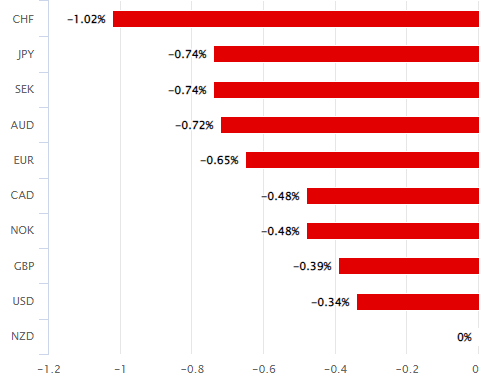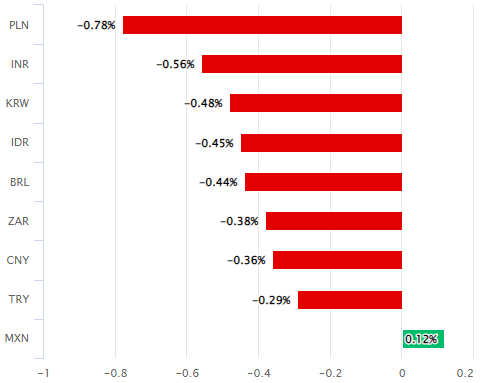New Zealand Economy and the Kiwi Dollar: Analyst and Economist Views
- Written by: James Skinner

Pine timber being exported from Wellington, New Zealand. Photo by James Anderson, World Resources Institute.
The New Zealand Dollar was a clear underperformer in the penultimate session of the week after Statistics New Zealand announced a steep final quarter fall in economic output that heightens the probability of a recession in the near future, drawing a mix of responses from analysts and economists.
New Zealand's Dollar ceded ground to all other currencies in the G10 and G20 baskets on Thursday, despite broad gains for stock markets and other risky assets as well as widespread losses for U.S. Dollar exchange rates.
Underperformance came after Statistics New Zealand said the economy shrank by an estimated -0.6% in the final quarter last year, making for a deeper setback than the -0.2% contraction envisaged by the consensus among economists.
Above: New Zealand Dollar performance relative to G10 (left) and G20 (right) currencies. Click image for closer inspection.
Compare GBP to NZD Exchange Rates
Find out how much you could save on your pound to New Zealand dollar transfer
Potential saving vs high street banks:
NZ$5,350
Free • No obligation • Takes 2 minutes
All sectors contracted with the deepest declines in output observed within primary industries including agriculture, forestry, fishing and manufacturing.
However, the utility sector also shrank going into year-end while the mining and construction sectors grew strongly for a second successive quarter.
The data will be most disappointing for the Reserve Bank of New Zealand (RBNZ) and its forecast for a 0.7% increase in GDP and has drawn mixed responses from analysts and economists, some of which are included below.
Nick Tuffley, chief economist, ASB Bank
"This was close to ASB’s -0.5% estimate, but quite a bit softer than the consensus pick (-0.2%) and much, much weaker than the 0.7% lift the RBNZ expected."
"Much has been made of if and when NZ will enter recession, but conditions are already recessionary for the manufacturing and the retail trade & accommodation sectors. NZ manufacturing output has now fallen for four consecutive quarters, often by quite chunky margins."
"Consistent with those production figures, softness was broad-based – flat private consumption (0.0% qoq), significant falls in fixed capital formation (-1.9%) and general government expenditure (-2.4%) and weak net exports (-2.8%). The latter was driven largely by lower goods exports."
"GDP figures are volatile, backward looking and are prone to substantial revisions at this best of times. The volatility is doubly so in the present environment, with the pick-up in travel over the latter part of 2022 and the impact of Cyclone Gabrielle keeping the path of growth lumpy."
"Nonetheless, its evident substantial headwinds are building for the NZ economy over the medium term. Headwinds to growth are manyfold."
"With inflationary pressures proving stubbornly persistent, the RBNZ has implemented a substantial amount of monetary tightening to cool the economy already, with much of the impact still not entirely felt."
Andrew Boak, chief economist for Australia & New Zealand, Goldman Sachs
"We note today's data predate the severe weather events in 1Q2023 which we expect will further weigh on growth in early 2023 - and while there remains significant uncertainty we cannot rule out a technical recession in NZ in the very near-term given these dynamics."
"Despite this, we expect the RBNZ to maintain a tightening bias as it places greater emphasis on the medium-term outlook for inflation and inflation expectations and relatively less emphasis on the slowing growth momentum - as they have highlighted at the February meeting."
"We continue to expect a 25bp hike at the April RBNZ meeting to a terminal rate of 5% as our base case, although we acknowledge the great uncertainty around this outlook in light of recent volatility in global financial markets and the banking system."
To optimise the timing of international payments you could consider setting a free FX rate alert here.
Miles Workman, senior economist, ANZ
"Noise, pockets of softening demand, and biting capacity constraints: Q4 GDP data had something for everyone."
"Bottom line: the noise in these data is still deafening. We didn’t take the full signal from Q3’s whopper +1.7% q/q growth rate, and we’re not taking the full signal from Q4’s payback either. That’s not to say economic momentum isn’t slowing – it most certainly is – but rather, Q4 quarterly growth overstates the pace."
"Downside surprises on the activity data are unlikely to move the dial for the OCR until they are accompanied by clear evidence that the current extreme mismatch between labour supply and labour demand has turned a corner (and the noise ceases to reverberate."
Elsa Lignos, global head of FX strategy, RBC Capital Markets
"AUD is in third place on a strong labour report while NZD is worst in G10 on weaker GDP (we are long AUD/NZD, now flat)."
"Feb labour force was a key dataset for the RBA ahead of its next meeting on 4 April. Our key takeaway is that it confirms a healthy and tight labour market but one that is probably past its best with early signs of moderation."
Michael Gordon, acting chief economist, Westpac New Zealand
"Annual growth of 2.2% is a full percentage point lower than what we expected, and almost 2ppts lower than what the RBNZ was expecting."
"The weakness was more broad-based than we expected, with declines in both the goods and services sectors. The biggest drag on activity was in manufacturing."
"While the economy is widely expected to slip into recession as higher interest rates bite, we suspect that the December quarter results represent more of an air-pocket in our descent, rather than an earlier and harder than expected landing."
"Higher-frequency data has actually improved a little in the first two months of this year, and the clean-up from Cyclone Gabrielle will generate extra activity in the coming months that will add to measured GDP."
"The crucial thing for the RBNZ, though, is that the starting point for the economy is substantially less stretched than they thought. And that matters for how much of a slowdown is needed to bring inflation back under control."






